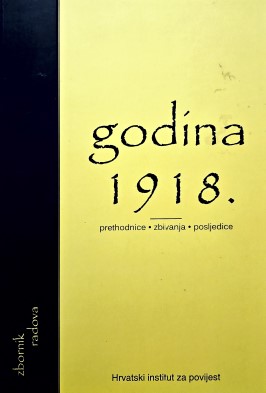Politika zapadnih velesila prema južnim Slavenima 1918. i 1919. godine
The Politics of the Western Great Powers toward the South Slavs in 1918 and 1919
Author(s): Andrej Rahten
Subject(s): Military history, Political history, Government/Political systems, Political behavior, Comparative politics, Pre-WW I & WW I (1900 -1919)
Published by: Hrvatski institut za povijest
Keywords: World War I; Austro-Hungarian Monarchy; State of Slovenes Croats and Serbs; Peace Conference in Paris;
Summary/Abstract: The disintegration of the Austro-Hungarian Monarchy in 1918 and the end of the First World War the political elites of the South Slav peoples awaited with fear for the loss of large portions of their ethnic territory, but also with the expectation that the western Great Powers would support their ambitions for statehood. The expectations arose mostly after the proclamation of American President Thomas Woodrow Wilson’s famed “Fourteen Points.” Above all, South Slav political elites in the Monarchy believed that Wilson’s notion of defense for the rights to people to self-determination would trump the Italian territorial demands based on the “London Agreement” of 1915. However, the attitude of the United States, Great Britain, and France at the peace conference in Paris (1919–1920) did not fulfill the expectations of Slovene and Croatian politicians. Wilson did, indeed, put pressure on the Italian delegation on the issue of territorial delimitation with the newly created South Slav state in Istria and Dalmatia, but without great success. With regard to the northern border of the Kingdom of Serbs, Croats, and Slovenes, Wilson’s politics in fact contributed to the inclusion of a large portion of ethnic Slovene territory in Carinthia into the Republic of Austria. The Kingdom of Serbs, Croats, and Slovenes had more support from the western Great Powers in delimiting its border with Hungary and in other sectors. In its final phase the diplomacy of the western Great Powers was disappointing in the eyes of the South Slav political elite, established as it was on the territory of what was once the Austro-Hungarian Monarchy. However, from the point of view of the Karađorđević state, the peace conference merely confirmed the trend toward realizing Greater Serbian territorial pretensions which, with the support of Great Britain and France, was begun during the Balkan wars in 1912 and 1913.
Book: Godina 1918. Prethodnice, zbivanja, posljedice
- Page Range: 247-256
- Page Count: 10
- Publication Year: 2010
- Language: Croatian
- Content File-PDF

